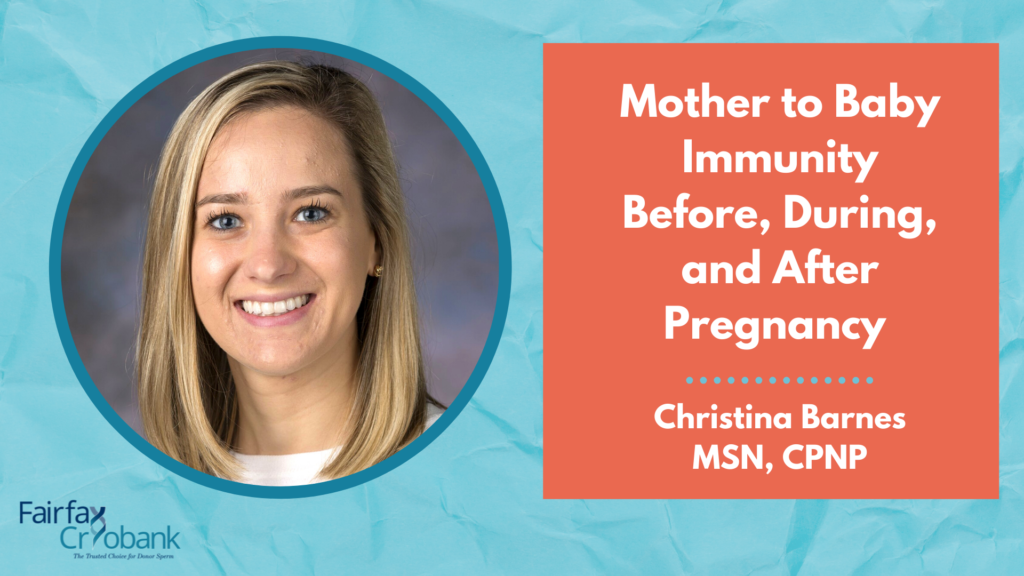Mother to Baby Immunity Before, During, and After Pregnancy
Guest Blogger, Christina Barnes, MSN, CPNP, breaks down the immune system, vaccines during pregnancy, and explains mother to baby immunity.

If you’re pregnant or preparing to become pregnant, it’s important to discuss your immunity and vaccination status with your OB-GYN or midwife. During pregnancy, a mother’s body passes her immunity on to the growing fetus, giving the baby a cushion of protection after birth. If a mother breastfeeds, her breastmilk will also pass immune cells to the baby. This guide will give you an overview of how this happens, why maternal immunity is important, and what you need to consider before, during, and after pregnancy.
Immune System Basics
Before we can understand how a mother’s immunity against certain diseases can pass to the baby during pregnancy and breastfeeding, we must first understand how the immune system works. In a healthy individual, the immune system defends against viruses and bacteria and attacks those that have entered the body. Active immunity happens when we are exposed to a virus or bacteria, while passive immunity happens when we receive immune cells from someone else who has already been exposed to a virus or bacteria.
Active Immunity
The immune system’s work is easiest to see when it attacks bacteria and viruses that have entered your body. The skin, for example, works to keep viruses and bacteria out of the body. If you develop a cut on your skin, that barrier is broken and bacteria can enter the body through the cut. The cut may then become tender, red, or swollen. These resulting signs of infection, such as redness, swelling, and pus, are signs that your immune system is trying to kill those bacteria.
Different cells that make up your immune system have different roles in this process; some patrol the bloodstream for signs of invaders, some eat the bacteria cells, and some identify and remember the bacteria as an invader for potential future exposures. Pus, for example, is created when white blood cells travel to the infection, eat bacteria cells, and die. It is quite literally visible evidence that your immune system is working!
While the immune system may produce dramatic signs as it attacks viruses and bacteria (think: pus, swelling, fever), its work to defend our bodies against known germs happens quietly in the background.
When we are exposed to a germ, through contact with a sick person or through a vaccine, our immune systems remember that germ. Different cells in our immune system create markers (also known as antibodies) to identify that germ in the future. If we are exposed again, antibodies attach to that germ, signaling for other cells to kill it before it has the chance to make us sick. This is the basic science of vaccines: exposure to a virus or bacteria gives our immune systems a map for identifying and killing that germ quickly. In other words, you have “immunity” against that virus or bacteria.
Passive Immunity
Passive immunity occurs when a person receives immune cells from someone else who has already been exposed to a certain disease. Let’s say Person A is the person with the active immune cells, and Person B is the one receiving those cells.
Person A has active immunity towards a disease through exposure or vaccination (as discussed above). Person B has never been exposed to or vaccinated against the disease, so Person B has no immune cells that recognize that specific disease.
In passive immunity, Person B gets the actual immune cells, known as antibodies, from Person A. This type of immunity is not permanent; eventually, the antibodies from Person A will leave Person B’s system. Passive immunity usually lasts for a few weeks to a few months, depending on the virus or bacteria. However, Person B will have the ability to develop his own active immunity against these diseases through exposure or vaccination.

Mother to Baby Immunity
One of the many amazing ways a mother’s body protects her developing infant is through passive immunity, where a mother’s body gives her own antibodies to the fetus through the placenta. These antibodies exist in the mother’s body as the result of previous exposure to diseases and vaccinations. If a mother has antibodies to protect against the flu, those antibodies will pass to the fetus and he or she will be born with some level of protection against the flu.
After birth, the mother can continue to pass on her immunity to her infant through breast milk. Antibodies from the mother are present in breastmilk, and enter the infant’s body when he or she drinks it. Breast milk has antibodies regardless of whether it is pumped or straight from the breast, so either way, a breastfeeding mother is giving her baby the benefit of her immunity. If a mother isn’t able to breastfeed, that’s OK too – the baby still received the benefits of her immunity during pregnancy, and childhood vaccines provide excellent long-lasting active immunity.
Things to Know Before, During, and After Pregnancy
Titers – Your OB-GYN or midwife will likely measure your titers either before or during pregnancy. A titer is a blood test that measures the levels of antibodies in a person’s blood for a specific virus or bacteria. Titers can be used to show whether a person has immunity for certain diseases: for example, a measles titer test will show whether or not you have antibodies against the measles virus. If you have enough of these antibodies, you have immunity against measles.
Vaccines Before Pregnancy – If you have your titer levels tested before pregnancy, you can figure out what diseases you don’t have antibodies for. This way, you can easily get any necessary vaccines before you become pregnant and make sure you’re immune for the health of you and your baby.
Vaccines During Pregnancy – If you have your titers drawn during pregnancy, you may be able to use that information to get vaccinated. However, some vaccines are not able to be given during pregnancy, so you would have to wait until after delivery to get those immunizations. For vaccines that are safe to give during pregnancy, such as the flu shot, speak with your provider about if and when you should get those shots.
Spouses and Family Members – Many providers recommend that spouses and family members living in the same household as the newborn receive certain vaccines to protect the baby after birth. The TDaP vaccine covers adults against tetanus, diphtheria, and pertussis and is important for those who will be interacting with the baby. Pertussis, also known as whooping cough, can be fatal for newborns, and babies aren’t fully immunized against pertussis until 15-18 months (if following the CDC child immunization schedule). So if they are exposed to pertussis in the first year and a half of life, they could become quite sick. This is a key example of how vaccines protect others, and not just the person getting the vaccine. For anyone who is a non-pregnant spouse or family member, it’s a good idea to schedule an appointment with your primary care provider to discuss your vaccination status.







